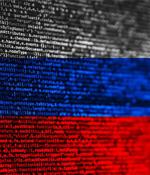Security News

A broad range of threat actors, including Fancy Bear, Ghostwriter, and Mustang Panda, have launched phishing campaigns against Ukraine, Poland, and other European entities amid Russia's invasion of Ukraine. Google's Threat Analysis Group said it took down two Blogspot domains that were used by the nation-state group FancyBear - which is attributed to Russia's GRU military intelligence - as a landing page for its social engineering attacks.

Russia says some of its federal agencies' websites were compromised in a supply chain attack on Tuesday after unknown attackers hacked the stats widget used to track the number of visitors by multiple government agencies. The list of sites impacted in the attack includes the websites of the Energy Ministry, the Federal State Statistics Service, the Federal Penitentiary Service, the Federal Bailiff Service, the Federal Antimonopoly Service, the Culture Ministry, and other Russian state agencies.

While Russia is fighting a physical war on the ground against Ukraine, advanced persistent threat groups affiliated with or backing Vladimir Putin's government are ramping up phishing and other attacks against Ukrainian and European targets in cyberspace, Google is warning. There have been a recent spate of distributed denial-of-service attacks against Ukrainian government sites, such as the Ministry of Foreign Affairs and the Ministry of Internal Affairs, as well as key services that help Ukrainians find information, such as Liveuamap, according to Google TAG. China's Mustang Panda also has joined the fray, using the war in Ukraine to target European entities with lures related to the Ukrainian invasion in a recent phishing campaign.

Before it began, I'd been really worried about Russian cyberattacks, which would overrun Ukraine and flood into the West's infrastructure. Where are those massive attacks? Why is Ukraine's electrical system still up and running - except for damaged nuclear reactors? Why, instead of shutting down Ukraine's TV networks with cyber attacks, did they have to blow up a Kyiv TV tower? Did we just let paranoia overrule our common sense?

Twitter is now accessible over the Tor network, allowing users in countries that banned it to continue accessing the social network's site. The new onion URL was announced today by security engineer Alec Muffett who announced that Twitter can now be accessed worldwide via the Tor browser.

ProtonMail is urging its Russian user base to hurry up and renew their subscriptions before it is too late, as multiple payment processing services including Mastercard, Visa, American Express, and PayPal, are exiting the Russian market. ProtonMail is a provider of privacy-centric and end-to-end encrypted email services to millions around the world.

Security vendors pledge free protection for US hospitals and utilities amid fear of Russian cyberattacks. With that in mind, three security companies are offering their products for free to US hospitals and utilities.

Coinbase, one of the most popular cryptocurrency exchange platforms, announced today that it's blocking access to more than 25,000 blockchain addresses linked to Russian individuals and entities. When the United States sanctioned a Russian national in 2020, it specifically listed three associated blockchain addresses. Through advanced blockchain analysis, we proactively identified over 1,200 additional addresses potentially associated with the sanctioned individual, which we added to our internal blocklist," Grewal said.

A new data wiper malware has been observed deployed against an unnamed Ukrainian government network, a day after destructive cyber attacks struck multiple entities in the country preceding the start of Russia's military invasion. Slovak cybersecurity firm ESET dubbed the new malware "IsaacWiper," which it said was detected on February 24 in an organization that was not affected by HermeticWiper, another data wiping malware that targeted several organizations on February 23 as part of a sabotage operation aimed at rendering the machines inoperable.

The Russian government shared a list of 17,576 IP addresses allegedly used to launch distributed denial-of-service attacks targeting Russian organizations and their networks. "The National Coordinating Center for Computer Incidents in the context of massive computer attacks on Russian information resources recommends taking measures to counter threats to information security," the Russian government agency said in a notice.